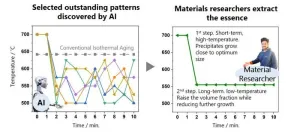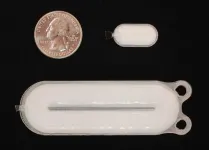(Press-News.org) During the first two years of the pandemic, a COVID-19 infection during pregnancy increased the risk of preterm birth and NICU hospitalizations. However, by 2022, when COVID-19 vaccines were readily available in the United States, this effect disappeared – suggesting that vaccination against the coronavirus may have prevented thousands of preterm births, according to a new study led by Stanford sociologist Florencia Torche.
The study’s findings, published Nov. 27 in the journal Proceedings of the National Academy of Sciences, show how vaccination against COVID-19 may have helped a generation of U.S. children avoid the long-term health issues and costs associated with premature delivery. As previous studies have shown, children who are born prematurely are more likely to encounter educational and economic setbacks later in life.
“The effects of COVID-19 on infant health may be among the most enduring legacies of the pandemic,” said Torche, the Dunlevie Family Professor in the School of Humanities and Sciences. “I hope the study provides strong evidence supporting the benefits of vaccination for the health of the next generation.”
Studying the effects of COVID-19 infection
Torche, along with Jenna Nobles at the University of Wisconsin-Madison, based their study on natality data for California, a diverse and populous state that accounts for 12% of all U.S. births.
In June 2020, California began recording confirmed or presumed cases of COVID-19 infection for all mothers giving birth. This is also when the researchers began their analysis, focusing on facilities with documented, universal testing.
The researchers identified infants with siblings in the California birth records, which allowed them to compare “treated” infants exposed to COVID-19 infection in utero with their “untreated” siblings who did not experience a COVID infection.
The researchers also took into consideration the zip code of the mother’s residence to compare areas that had low and high uptakes of vaccination against COVID-19.
Some of Torche and Nobles’ key findings include:
Maternal COVID-19 infection increases the probability of preterm delivery, defined as a birth that occurs before 37 weeks of gestation, by 1.2 percentage points, from 7.1 to 8.3%. “This effect is roughly equivalent to in utero exposure to a 9 percentage point increase in the area-level unemployment rate – or to high-intensity wildfire smoke for 20 days – an enormous impact,” the researchers write.
Maternal COVID-19 infection also led to higher rates of premature delivery before 32 weeks of gestation, resulting in infants facing the highest risk of mortality, morbidity, and developmental difficulties later in life.
By January 2022, the impacts of COVID-19 on preterm births dropped to zero, but zip codes that had high vaccination rates saw the harmful effects disappear a year earlier than areas with a slower vaccination uptake.
How COVID-19 may exacerbate inequality
Torche and Nobles’ study is one of the first to offer a causal estimate of the impact of maternal COVID-19 infection on neonatal health.
With vaccine rates for the most recent booster hovering at about 7% of U.S. adults, Torche hopes the study emphasizes the importance of staying protected against the virus.
“Unfortunately, even if the adverse impact of COVID-19 infection on preterm birth has plummeted to zero, this adverse impact is likely to emerge again as the virus continues to evolve and mutate, and as vaccine-driven immunity wanes,” Torche said.
The study builds on Torche and Nobles’ previous work that looked at the socioeconomic disparities of the COVID-19 pandemic and its impacts on inequality in the U.S. – an issue Torche is concerned about here, too.
“Barriers to vaccination are higher in disadvantaged and racialized populations, including people with less education and those living in rural areas, i.e. populations that experience much worse infant health even in absence of COVID-19,” Torche said. “This suggests COVID-19 will further exacerbate disparities in infant health in the United States.”
This research was funded by the Eunice Kennedy Shriver National Institute of Child Health and Human Development (NICHD) and by the National Science Foundation (NSF).
END
Maternal vaccination against COVID-19 lowered risk of preterm births, Stanford study finds
2023-11-27
ELSE PRESS RELEASES FROM THIS DATE:
UCF receives $1.5million NSF grant to improve energy efficiency of wireless communications
2023-11-27
Wireless devices consume more than just the hours users spend scrolling through social media, streaming podcasts and TV shows, and playing games. The networks used to connect these devices also consume a large amount of energy – up to a few thousand terawatt-hours annually worldwide, which is enough to power 70,000,000 homes for one year.
UCF researcher Kenle Chen aims to enhance the energy efficiency of these systems with the support of a $1.5 million grant from the National Science Foundation’s Addressing Systems Challenges through Engineering ...
No IKAROS, no antibodies
2023-11-27
A cell nucleus is a busy place. Cellular proteins twist and pull DNA, folding the genome into intricate 3D structures that support functioning of its coding parts.
This choreography is essential for cell development, and the exact steps vary wildly between cell types. Establishing proper communication between genes and far-away control switches at the right time in the right cell is not a small feat. In fact, very few proteins have the right combination of features to organize the genome into the right structures.
In ...
New framework for using AI in health care considers medical knowledge, practices, procedures, values
2023-11-27
Health care organizations are looking to artificial intelligence (AI) tools to improve patient care, but their translation into clinical settings has been inconsistent, in part because evaluating AI in health care remains challenging. In a new article, researchers propose a framework for using AI that includes practical guidance for applying values and that incorporates not just the tool’s properties but the systems surrounding its use.
The article was written by researchers at Carnegie Mellon University, The Hospital for Sick Children, the Dalla Lana School of Public Health, Columbia University, and the University of Toronto. It is published in Patterns.
“Regulatory ...
Increasing high-temperature strength of materials through collaborative efforts of AI and materials researchers
2023-11-27
1. A materials research team consisting of NIMS and Nagoya University has designed a novel two-step thermal aging schedule (i.e., non-isothermal aging or unconventional heat treatment) capable of fabricating nickel-aluminum (Ni-Al) alloys that are stronger at high temperatures than Ni-Al alloys fabricated using conventional thermal aging processes. This was achieved by using artificial intelligence (AI) techniques to identify several dozen different thermal aging schedules potentially effective in increasing alloys’ high-temperature strength. The mechanisms ...
The jigglings and wigglings of atoms reveal key aspects of COVID-19 virulence evolution
2023-11-27
Auburn, AL – Richard Feynman famously stated, “Everything that living things do can be understood in terms of the jigglings and wigglings of atoms.” This week, Nature Nanotechnology features a groundbreaking study that sheds new light on the evolution of the coronavirus and its variants of concern by analyzing the behavior of atoms in the proteins at the interface between the virus and humans. The paper, titled “Single-molecule force stability of the SARS-CoV-2–ACE2 interface in variants-of-concern,” is the result of an international collaborative ...
UCF receives 3 minority serving institution awards to promote collaborations with NASA
2023-11-27
ORLANDO, Nov. 27, 2023 – Three research projects from the University of Central Florida have been selected for NASA Minority University Research and Education Project Partnership Annual Notification (MPLAN) awards. The grants, worth up to $50,000 each, are designed to connect and promote research collaborations between Minority Serving Institutions and NASA Mission Directorates.
A total of 18 projects received Phase I funding across 15 universities. UCF received the most awards, with all three housed within the College of Engineering and Computer Science. Dean Michael Georgiopoulos ...
Stem cell-based treatment controls blood sugar in people with Type 1 diabetes
2023-11-27
An innovative stem cell-based treatment for Type 1 diabetes can meaningfully regulate blood glucose levels and reduce dependence on daily insulin injections, according to new clinical trial results from the University of British Columbia (UBC) and Vancouver Coastal Health (VCH).
“This is a significant step toward a functional cure for Type 1 diabetes,” said Dr. David Thompson, principal investigator at the Vancouver trial site, clinical professor of endocrinology at UBC and director of the Vancouver General Hospital Diabetes Centre. ...
Wave Devouring Propulsion: a revolutionary green technology for maritime sustainability
2023-11-27
A new form of wave devouring propulsion (WDP) could power ships and help to cut greenhouse gas emissions in the maritime industry.
Academics from Cranfield University have worked on the concept of using wave energy for propulsion, and designed an inventive method of achieving greater thrust from the power of the waves by harnessing a vessel’s submerged flapping foils in an innovative way.
Inspiration from whale fins
Taking inspiration from the power of a whale's fins, the team studied the structure and movement of the tail fin to unravel how it effectively uses wave energy for propulsion. Through simulations and experiments, they developed ...
Algorithmic recommendation technology or human curation? Study of online news outlet in Germany suggests both
2023-11-27
Recommender systems are machine learning applications in online platforms that automate tasks historically done by people. In the news industry, recommender algorithms can assume the tasks of editors who select which news stories people see online, with the goal of increasing the number of clicks by users, but few studies have examined how the two compare.
A new study examined how users of an online news outlet in Germany reacted to automated recommendations versus choices made by human editors. On average, the algorithm outperformed the person, but the person did better under certain conditions. The study’s authors suggest a combination of human curation and automated recommender ...
BU study finds breast density discussions with clinicians varied significantly by race/ethnicity and literacy level
2023-11-27
(Boston)—Breast density information aims to increase awareness of breast density and its risks and inform future breast screening decisions. Breast density notifications (BDN) advise women to discuss breast density with their clinicians, but prior research shows less than half of women in the general population have those conversations and little is known about the content of conversations that do occur.
A new study by researchers from Boston University Chobanian & Avedisian School ...



